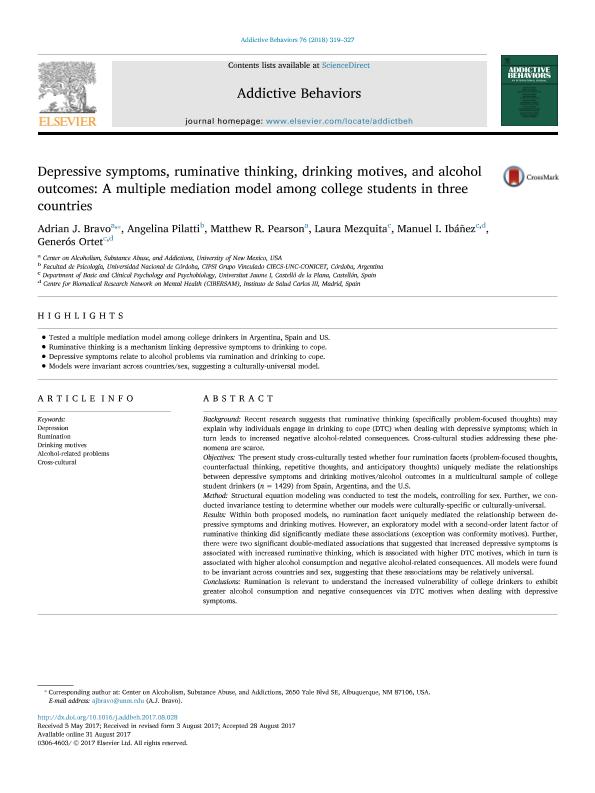Artículo
Depressive symptoms, ruminative thinking, drinking motives, and alcohol outcomes: A multiple mediation model among college students in three countries
Bravo, Adrían J.; Pilatti, Angelina ; Pearson, Matthew R.; Mezquita, Laura; Ibañez, Manuel I.; Ortet, Generós
; Pearson, Matthew R.; Mezquita, Laura; Ibañez, Manuel I.; Ortet, Generós
 ; Pearson, Matthew R.; Mezquita, Laura; Ibañez, Manuel I.; Ortet, Generós
; Pearson, Matthew R.; Mezquita, Laura; Ibañez, Manuel I.; Ortet, Generós
Fecha de publicación:
01/2018
Editorial:
Pergamon-Elsevier Science Ltd
Revista:
Addictive Behaviors.
ISSN:
0306-4603
Idioma:
Inglés
Tipo de recurso:
Artículo publicado
Clasificación temática:
Resumen
Recent research suggests that ruminative thinking (specifically problem-focused thoughts) may explain why individuals engage in drinking to cope (DTC) when dealing with depressive symptoms; which in turn leads to increased negative alcohol-related consequences. Cross-cultural studies addressing these phenomena are scarce. Objectives The present study cross-culturally tested whether four rumination facets (problem-focused thoughts, counterfactual thinking, repetitive thoughts, and anticipatory thoughts) uniquely mediate the relationships between depressive symptoms and drinking motives/alcohol outcomes in a multicultural sample of college student drinkers (n = 1429) from Spain, Argentina, and the U.S. Method Structural equation modeling was conducted to test the models, controlling for sex. Further, we conducted invariance testing to determine whether our models were culturally-specific or culturally-universal. Results Within both proposed models, no rumination facet uniquely mediated the relationship between depressive symptoms and drinking motives. However, an exploratory model with a second-order latent factor of ruminative thinking did significantly mediate these associations (exception was conformity motives). Further, there were two significant double-mediated associations that suggested that increased depressive symptoms is associated with increased ruminative thinking, which is associated with higher DTC motives, which in turn is associated with higher alcohol consumption and negative alcohol-related consequences. All models were found to be invariant across countries and sex, suggesting that these associations may be relatively universal. Conclusions Rumination is relevant to understand the increased vulnerability of college drinkers to exhibit greater alcohol consumption and negative consequences via DTC motives when dealing with depressive symptoms.
Archivos asociados
Licencia
Identificadores
Colecciones
Articulos(CIECS)
Articulos de CENTRO DE INVESTIGACIONES Y ESTUDIO SOBRE CULTURA Y SOCIEDAD
Articulos de CENTRO DE INVESTIGACIONES Y ESTUDIO SOBRE CULTURA Y SOCIEDAD
Citación
Bravo, Adrían J.; Pilatti, Angelina; Pearson, Matthew R.; Mezquita, Laura; Ibañez, Manuel I.; et al.; Depressive symptoms, ruminative thinking, drinking motives, and alcohol outcomes: A multiple mediation model among college students in three countries; Pergamon-Elsevier Science Ltd; Addictive Behaviors.; 76; 1-2018; 319-327
Compartir
Altmétricas



